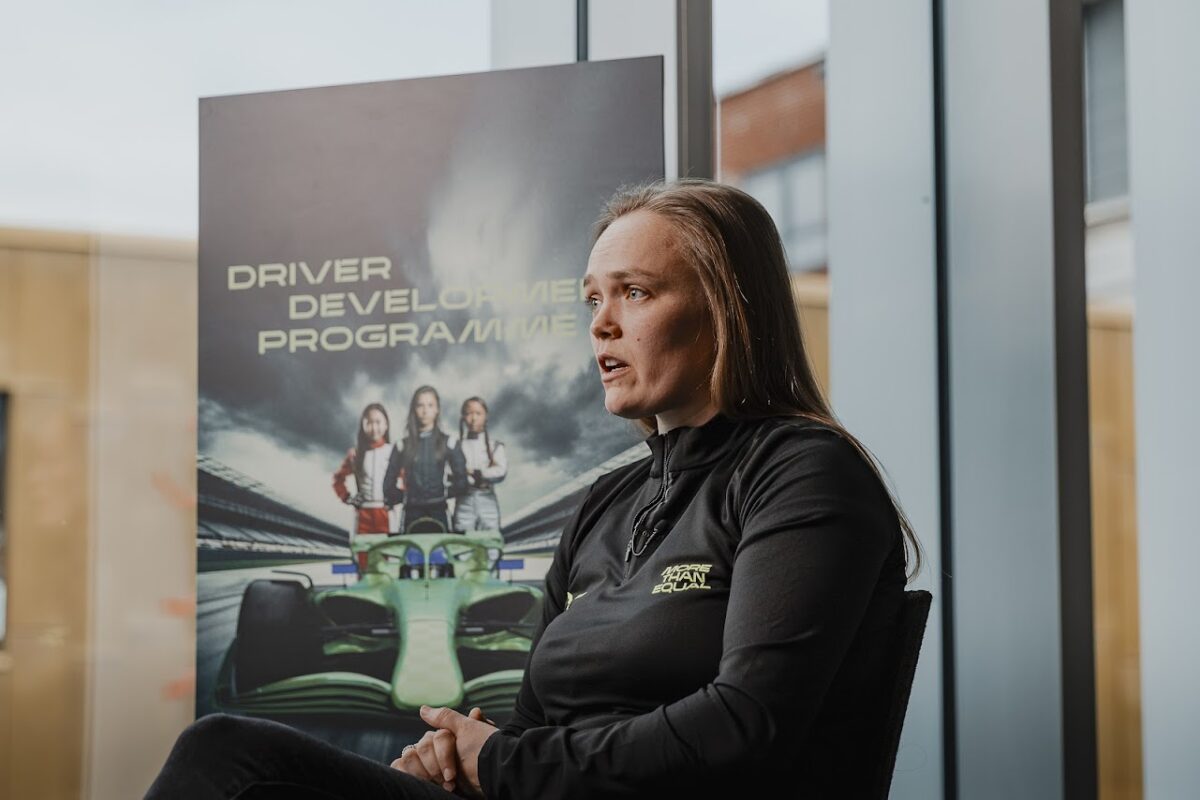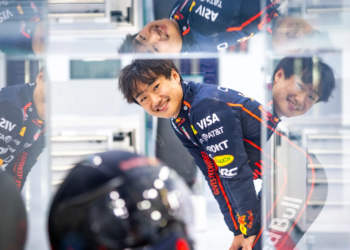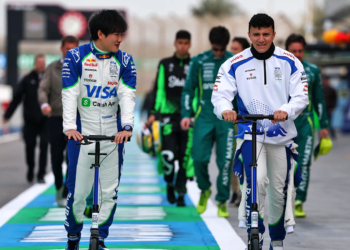More Than Equal is the initiative dedicated to addressing the lack of female representation in motorsport by nurturing and unearthing not only the next wave of female racing talent but also the first female Formula 1 champion. To aid the initiative in its goal, More Than Equal has set up a one-of-a-kind female driver development programme to guide the next generation of women racers. Britcar and Ginetta Junior Champion Sarah Moore was announced last month as one of the programme’s coaches.
Moore boasts 25 years of experience in racing and a further eight years in coaching. Her racing career started in karting at the age of four and her Ginetta Junior Championship success in 2009 set her on a path to break boundaries in her career. Her 2018 Britcar Endurance title made her the first female champion in the series and in 2021, Moore became the first openly LGBTQ+ racing athlete to stand on a Grand Prix podium thanks to a rostrum finish in the Austrian round of the W Series. In 2023, Moore went on to become the first female racer to win in the Indian Racing League and is now ready to impart her knowledge to the next generation and Motorsport Week had the privilege to discuss her plans as a coach and how her own experiences will benefit the inductees to the programme.
Q: When did you first become aware of the More Than Equal programme and how did you become a part of the coaching team?
SM: I think it was probably, around September time last year. I think it just popped up on Instagram, – the More Than Equal page. And then I kind of just kept an eye on it from there. A couple of drivers that I know had seen it as well. They’ve got busy lives themselves, but they just said it might be a good thing to go for. So I think it was probably late September and October when I kind of applied for it.
Q: What was it about the programme that made you want to be a coach – what drew you to it?
SM: I mean, I’ve been a coach, I suppose, for about 10, 12 years now. But I think the main thing for me is, I guess giving back to help develop future female talent. I’m kind of at an age now where, I mean, I’ve probably never stopped racing as such, but an age where it’s kind of fizzled out due to lack of budget for myself. So I think if there’s any way that I can give back to the future generation or the next generation of talent. That was kind of the main thing for me.
Q: Regarding your position as a coach for this next generation of female drivers, that’s something that you didn’t necessarily have much access to in the early days of your career. Does that give you extra motivation as a coach in More Than Equal?
SM: I guess yes and no. I never really had a coach probably until I was in the W Series, to be honest, but I was very fortunate in the fact that I followed my older brother’s footsteps. I kind of learned from everything that he’d done before me. So I guess he was kind of a bit of a mentor or coach to me really, but I never had someone in that position. But I think just being a female coach, you know, there’s not too many of us and to try and get the participation of females up in the sport. I think having female coaches visible, that’s always going to help the younger generation in the fact that if I’ve got information that I can pass down to them and they can see that I’ve been there and done it myself, then they’re more likely to try and pursue it as well.
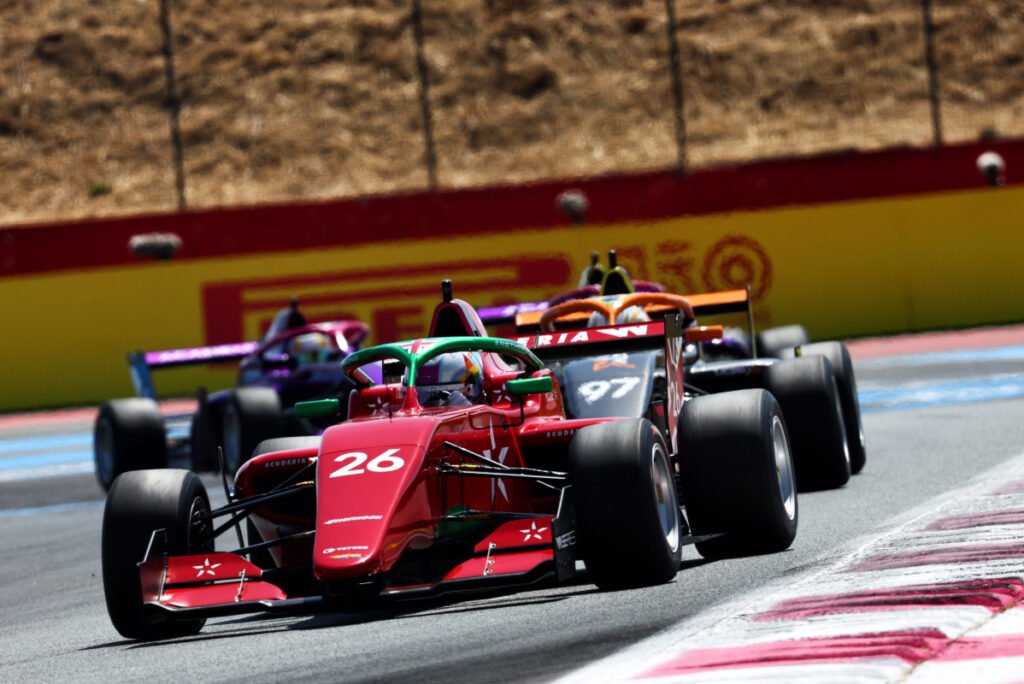
Q: What are the specific learnings that you want to pass down as a coach?
SM: Learning the basics of everything you need, it all depends on what step of the journey the driver is at, obviously, when you step in to start coaching them. So you kind of have to learn or get to know the driver as such. And it’s working out what their strengths and weaknesses are because everyone is different and trying to, I guess, work on their weaknesses to bring them up more towards being a bit more of a strength or less of a weakness. And as I say, every driver is different and it all depends on what category you’re in. Coaching a driver who’s in karting will be very different to coaching a driver in a formula single-seater car. So it all depends on what stage they’re at. But, there’s everything from trying to get them to understand how you need to brake and why you need to brake that way, why that’s an advantage. Same with getting on the power, steering inputs, everything you do, you know, in a go-kart makes a huge difference. But there are also a lot of transferable skills from go-karting to formula as well.
Q: The More Than Equal Development Programme is unique in its dedicated approach to bringing on female talent, just how important a role does this have in developing female representation in motorsport?
SM: I think the More Than Equal development programme is good in the fact that it’s not attached to a team. It’s not a championship. It’s this own standalone thing. So I think it would be hoping that will be more accessible for the drivers to, maybe in the future, work amongst different teams, different championships. But I just think the key thing for me was being visible as a female coach as part of More Than Equal to give my experience. And I think just being visible there and working with the future female talent that we eventually pick will hopefully help to bring more female talents through.
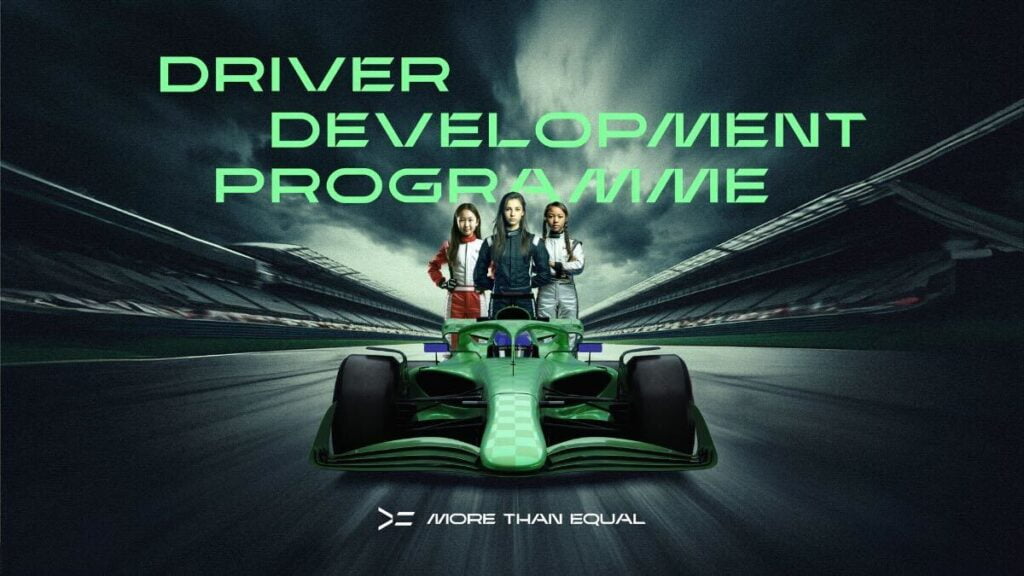
Q: You talk of visibility there, would you say that’s probably one of the most important things when it comes to encouraging female athletes in motor racing, just having that visibility – what else do you think everybody should be doing to encourage more female athletes in motorsport?
SM: I think visibility is by far probably one of the biggest things, but you know it’s one thing getting visibility, but a driver that gets visibility also still needs to be putting the work in behind the scenes. So from a driver’s point of view whether you’re visibly seen at the gym or seen at the simulator, et cetera, you still need to be putting those efforts in, putting the hours in to make sure that as a driver, you’re in the best place possible. The visibility definitely makes a difference. For example, when I was part of the W Series, especially when we became part of the Formula 1 weekend, the visibility for us as drivers increased two, three times over, for me personally. And along with that came a huge learning curve in terms of me as a driver learning to drive that car and what I needed to change and improving myself. So although visibility is hugely important, I think you need to visibly see that there are female drivers and female talent out there, you know the drivers definitely need to make sure that they’re putting the effort in.
Q: You’ve had landmark moments in your career where you’ve made history: being the first female champion in Britcar, and then your podium in W Series made you the first LGBTQ+ driver to step onto a Grand Prix podium. Would you say that one of the goals of this programme is rather than those moments being stand out, that they become in the future commonplace, it’s not something that people go, ‘oh, this is the first or this is unique,’ it’s just part of the language and is something that’s always happened?
SM: Yeah, 100% definitely. I think that’s something as a female in the sport, I think we can probably, most of us, you know, all of us would probably say the same thing and the fact that you know, we would love for it, we just want to be treated as equal. We want to be treated as drivers, you know, we’re all the same as soon as that helmet is on. So whether you’re a male or a female, that’s won a race or a championship, it really shouldn’t matter. It should all come down to talent at the end of the day. And I think the thing is at the moment is so big that when a female does win a championship or a race because there are still so few of us I think it is worth chatting about because I think that then links back to the fact that that brings the visibility and the fact that a female has just won whatever race it is or whatever championship it may be. And that just proves that it is possible. I think there are three championships that I’ve won and been the first female driver to win. And I won’t say, you know, I don’t really cling on to, when I kind of say it to anyone, I never say it that way. I just say, ‘oh, I was the Brit car champion or I was the Ginetta Junior Champion.’ I don’t really ever say it as I was the first female champion.
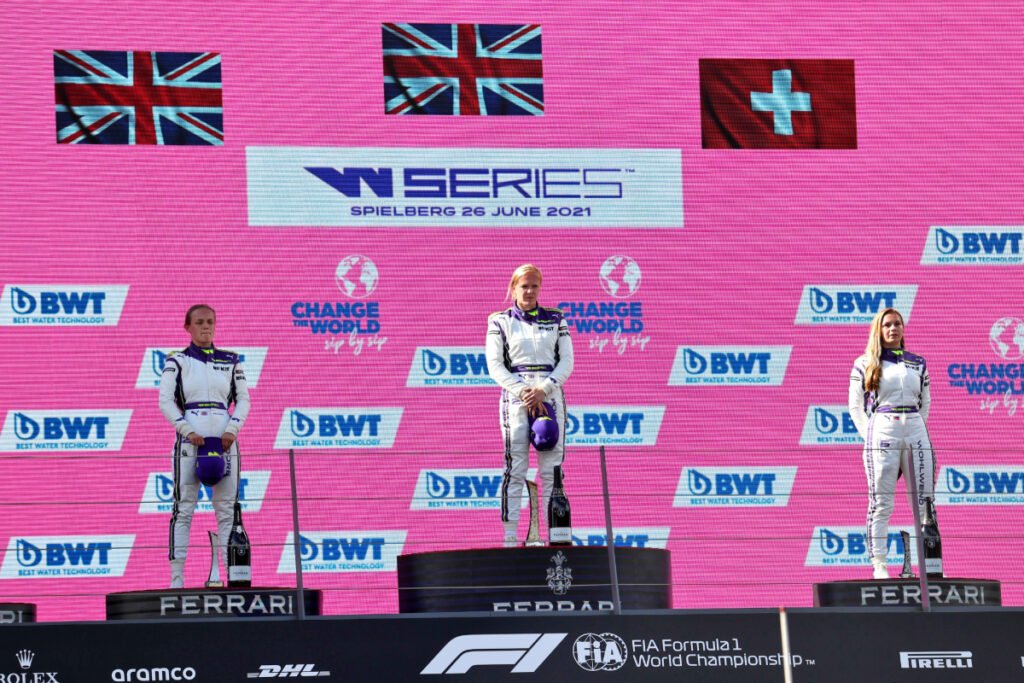
Q: What female motorsport role models have you had, either inside or outside of the car?
SM: I get asked this question quite a lot. As a kid growing up, I never watched TV. I was always kind of at a racetrack as such and I never really thought about the fact that I was the only girl in the paddock, you know, there was a few other girls that kind of raced in the categories around me, but I never watched TV or anything like that to visibly see any female models. Everyone only really ever knew of the drivers that were in Formula One, which obviously when I was younger were all male because there’s not been a female racing in F1 since the 70s. So the simple answer to that I guess is no.
Q: What was the moment or what was it that inspired you to become a racing driver? How did that begin?
SM: It was easy for me. It’s just in the family. So the fact that I was a female had absolutely nothing to do with it. To be honest. My dad used to race and as I say, my brother. We all picked up racing from a very young age, we all started when we were kind of four or five years old. So, you know, from there, I guess there was no going back. It started as fun and then at some point, it started to get a bit more serious. When you start winning races, then it starts to get a bit more serious. You think, yeah, maybe this is something that I could probably make a career out of.

